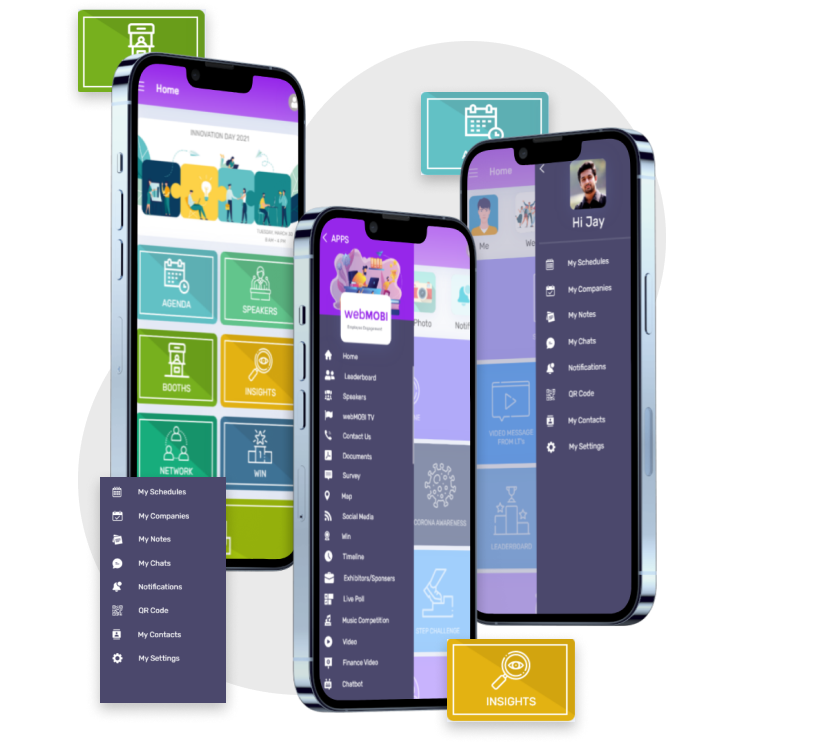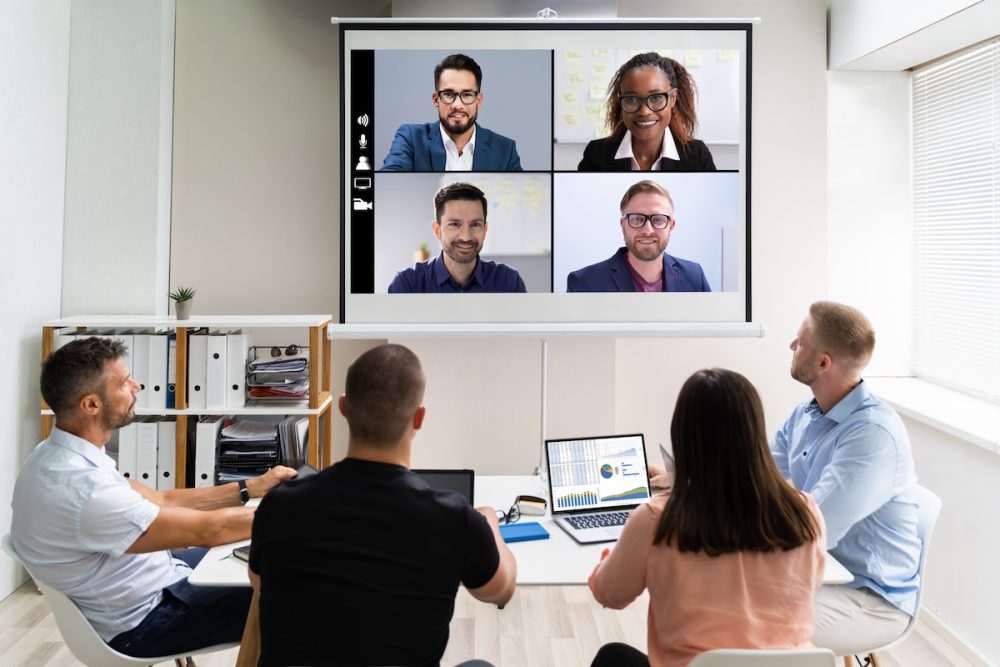Hybrid events are on the rise, and event planners should always be aware of hybrid event trends. Such events are held by combining onsite events and online events, and they have a lot of benefits for event organizers. They are cost-effective, flexible, and allow for a large number of participants.
What are hybrid events, and why are they so popular?
Hybrid events are events that combine both virtual events and offline events. They are becoming increasingly popular because they offer a variety of benefits for organizers.
For participants, a hybrid event strategy provides an opportunity to interact with others in a virtual setting while also experiencing the physical event. This can be helpful for people who are shy or have difficulty meeting new people in person. It can also be helpful for people who are disabled or unable to travel.
For event managers, a hybrid event strategy offers a way to extend the reach of their event. By combining online and offline components, they can attract more participants and generate more revenue. They can also improve the overall experience for attendees by providing better access to resources and services.
Ten popular hybrid event trends
Here are the ten most popular hybrid event trends for event organizers to watch out for.
1. Academic conferences are increasing
Academic conferences are trending types of hybrid event solution as it combines both offline and virtual events. The popularity of these events can be attributed to the benefits they offer participants, including networking opportunities, learning opportunities, and the opportunity to share knowledge with others in the field.
Some popular conference types include:
Industry conferences
These events provide an opportunity for companies to share information and collaborate with other businesses in the same industry.
Research conferences
These events allow academics to share their latest findings with fellow researchers and receive feedback on their work.
Student conferences
These events provide students with a platform to showcase their work and connect with potential employers or mentors.
Conference series
These events are held over a number of days or weeks and offer a variety of topics that might interest attendees.
2. Micro-events are on a growing trend
Micro-events are a growing trend in the event industry. They allow businesses to create engaging experiences for their customers without having to leave their desks. By using online tools, businesses can create mini-events that are specific to a particular product or service.
There are many benefits to using micro-events. They’re low-cost, easy to organize, and can be tailored to meet the needs of your business. They also provide a way for you to connect with your customers on an individual level. This is important because it builds trust and allows customers to feel like they’re part of your business community.
One of the biggest advantages of using micro-events is that they create awareness for your business. This is because people will know about your event and may choose to attend.
Micro-events are also a great way for your customers to receive updates about your business. This is especially important for small businesses that do not have a large web presence.
3. Internal meetings are going online
Since the dawn of the internet, employees have been able to collaborate remotely with colleagues. However, due to advances in technology and the ever-growing trend of working remotely, virtual internal meetings are now increasingly common for remote workers.
There are many benefits to conducting online internal meetings, including reducing distractions, improving communication, and boosting productivity.
The first benefit is that online internal meetings can be conducted from anywhere in the world. This means that companies can hire remote workers who don’t live close by, or who work flexible hours.
Additionally, since participants only need to access a computer or phone to participate in an online meeting, they can remain engaged in the conversation even if they are on their way to a meeting or traveling.
4. Event technology is evolving
Event technology is constantly evolving to keep up with the ever-changing hybrid event format. With more and more organizations moving away from traditional conference formats, event technology has had to adapt in order to meet the needs of attendees. Some of the most popular upgrades include:
Virtual reality (VR)
While VR can be a scary proposition for many, its potential as an event technology tool is huge. VR can be used to create immersive experiences that allow attendees to explore new products or learn about new services in a way that feels truly interactive.
Augmented reality (AR)
AR has already started to take off as a popular event technology tool. AR allows users to see information or objects overlayed in their real-world environment, making it a great way to provide supplemental information during presentations or help attendees navigate busy spaces.
Mixed reality (MR)
MR is another emerging technology that’s making it possible for the first time to have the best of both worlds – real physical space and virtual reality.
Check: WebMOBI event app
5. RIse of the hybrid recruitment process
The recruitment process is becoming more hybrid because businesses look for ways to save money and time. The combination of virtual and physical formats is growing in popularity, and businesses are finding that they can use both to save time and money.
One of the benefits of using hybrid event platforms is that it allows recruiters to reach a wider range of candidates. For example, they can post a job on a website, but also send out emails to potential candidates who have registered for an event. This way, they can target specific groups of people who might be interested in the job.
Another benefit of using a hybrid event solution is that it allows businesses to evaluate candidates quickly. They can view the resumes of candidates online, then reply to those who have applied with questions or an offer.
Overall, this hybrid recruitment trend is likely here to stay in the event industry as it allows businesses to find better candidates faster and assess their skills in a more realistic environment.
6. Hybrid tradeshows are earning more
Hybrid tradeshows are quickly becoming more popular than ever before. This is due to the combination of both online and offline participation.
By combining the two, attendees can get a better experience from both worlds at the event venue. For example, if someone wants to attend an event but doesn’t have time to travel, they can still participate by attending the online portion of the show.
Additionally, if someone prefers face-to-face interaction with other attendees, they can also attend the offline portion of the show. This way, everyone can get what they want out of a hybrid tradeshow.
7. Lower staffing required
While hybrid event sustainability requires a little more planning than traditional conferences, they typically don’t require the same number of staff members. This is thanks in part to the use of technology and automation, which can help manage event logistics and communications.
In addition, event planners can use the more flexible staffing model to recruit and schedule staff members according to their needs for a particular event.
Technology has allowed hybrid events to manage logistics and communications more efficiently than traditional conferences.
8. PR responsibilities have increased
Since the advent of hybrid events, PR agencies have had to become more skilled at working with multiple stakeholders. As a result, PR agencies are now more commonly hired for events that combine traditional and digital media. Here are some of the responsibilities of PR agencies in such a scenario:
Creating cross-platform content
This includes developing content for social media platforms (Facebook, Twitter, Instagram) as well as traditional media outlets. It’s important to make sure all content is high quality so that viewers can continue to trust you even after reading or watching different types of content.
Working closely with event planners
Oftentimes, planners will require input from PR firms before an event even begins in order to create a cohesive strategy. This coordination can be time-consuming but essential in ensuring the success of an event.
Working with social media influencers
Influencers are those people who have a large number of followers on social media platforms. These influencers can be other PR firms as well as individual content creators (bloggers, vloggers, etc. )
9. More focus on attendee engagement tools
Hybrid event platforms have caused event managers to focus more on attendee engagement tools such as live polls, word clouds, live quizzes, and Q&A sessions. These tools allow organizers to track the reactions of attendees and gauge the effectiveness of their programs.
Some organizations are using these tools to create interactive experiences that are tailored to their audience. For example, a company may release a poll about its upcoming product launch. By using this method, the company can ensure that all attendees have an equal opportunity to participate and provide feedback.
Word clouds and live polls are just two of the many audience engagement tools available. With so many options available, it’s important for organizers to choose one that will help them measure success. By understanding what’s working and what isn’t, they can make modifications accordingly.
Q&A sessions can be extremely effective, especially when they are a follow-up to the event. These sessions can be used to gather feedback from attendees and provide an opportunity for questions and answers that can be added to a website or other marketing material.
Live quizzes are another great way to engage attendees and measure success. These quizzes can be sent out via social media, or at the event, which will help attendees share their experiences with others. They can also be used to create a form that can be utilized by local businesses for marketing purposes.
10. Data collection practices have revolutionized
Virtual events have revolutionized the data collection practices by event organizers. The usage of virtual events has reduced the cost and time required to organize an event while also increasing the reach and engagement of participants.
By using online tools, such as social media platforms and event apps, event organizers can keep track of participant activity and collect data in real time.
Additionally, virtual events are more engaging for participants since they can participate from anywhere in the world. This accessibility allows event organizers to target a wider audience while still retaining control over the quality and accuracy of their data.
What will hybrid event planning look like in the next 5 years?
Hybrid event planning is set to take off in the next 5 years. With technology becoming more advanced and affordable, businesses of all sizes will be able to host virtual events with ease.
Hybrid event planners will use event technology such as WebMOBI to connect participants from around the world. This allows businesses to save on travel costs, and still provide a high-quality experience for their attendees. Additionally, virtual event planning can help businesses better connect with their target market.
By hosting a hybrid event, businesses can reach out to customers who may not be physically located near them. Additionally, hybrid event planning is an increasingly popular way for businesses of all sizes to generate quality leads.
Wrap Up!
In conclusion, event planners should consider these hybrid event trends along with other existing and upcoming trends in order to create successful events. By understanding the latest technology, planners can create engaging experiences that will keep attendees coming back.
Virtual tradeshow marketing tips




Leave a Reply